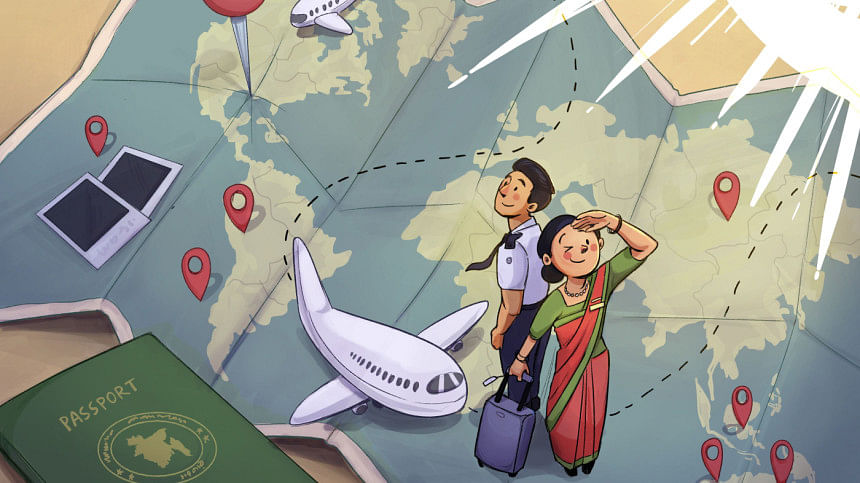Charting the course for a career as a flight attendant

The gate closes, the engines start, and the plane takes off. At 35,000 feet above, the world below blurs into scattered clouds and cities. You might be moving to a new country or going on a vacation to another destination, but for a flight attendant, it is just a part of their everyday job.
Becoming a flight attendant is a dream for many as it offers the chance to travel the world and work in an evolving environment. But behind the glamour lies hard work, rigorous qualifications, intense training, and demanding work schedules.
The qualifications needed can vary across airlines, but there are some universal requirements. Shamima Akter, a flight attendant at US-Bangla Airlines explained, "Men are generally expected to be at least 168 cm (5 feet 6 inches) tall, while women should be a minimum of 161 cm (5 feet 3 inches). Also, applicants must have an arm span of 212 cm while standing on their toes."
"Regarding physical requirements, the body mass index should generally range from 18-25 for males and 18-22 for females, with weight being proportional to height. Age is also an important factor as most airlines seek candidates between the ages of 18 and 27, though those with prior experience may be considered up to the age of 35. Lastly, good eyesight is crucial, as applicants need perfect vision without the use of corrective lenses or glasses," she added.

As for educational qualifications, Nisha Hossain Mim, a flight attendant at Biman Bangladesh Airlines emphasised that anyone can apply after completing A levels or the HSC examination, which can enable them to start their career at an early age.
Md Toki Tahmid Noman, a flight attendant at Biman Bangladesh stated, "I started while I was still an undergraduate student. It was difficult to balance classes and my job. I recommend joining either after graduation or during the final semester."
Ashiya Hussain, a flight attendant at Qatar Airways shared, "International airlines have a minimum age requirement of 21, and candidates must have completed at least the twelfth grade."
In addition to physical requirements and academic qualifications, language and presentation also play a big role. Toki stressed that fluency in English, a strong vocabulary, confident body language, and people management skills are essential.
While there are guidelines that can dictate the selection process, it remains competitive and multi-layered. Toki described it as: first a viva, then screening which is followed by written tests, and finally another viva. There are also assessments involving group work and written tasks to evaluate an applicant's strengths and weaknesses.
Most airlines publish job vacancies on social media or their official career pages. Once candidates are shortlisted, they are invited for interviews and assessments. Those who make it through begin training before officially joining flights.
The training itself is intense and spans from one to three months depending on the airline. Shamima shared, "Our training covers safety and emergency procedures like using fire extinguishers, oxygen masks, life jackets, and evacuation protocols. We are trained in CPR (cardiopulmonary resuscitation) and handling medical emergencies like heart attacks or childbirth on board."

Ashiya added, "Our training lasted two months at Qatar Airways. We had exams on every topic regarding safety, first aid, and customer service. Each year, we must renew our training and sit for exams again."
"There is a common misconception that flight attendants are only on board to serve food and drinks. However, passenger safety is a central part of our job. After takeoff, passengers become our responsibility," said Ashiya. "If someone gets sick or needs medical help, we must be prepared to help them."
Handling unpredictable passenger behaviour is also another part of the job. Toki explained, "Some passengers may try to smoke, act aggressively, and treat the aeroplane like their own personal space. In such cases, we have to act tactfully. These incidents happen maybe once or twice a month but having the knowledge to deal with people is extremely important."
Despite the perception many people may have, the job is far from glamorous. Not only is it physically demanding due to the long working hours as well as multiple consecutive flights but also because of the irregular sleep patterns, physical exhaustion, and emotional challenges involved.

"It is not a job that always looks fancy," said Nisha. "You have to deal with difficult situations like emergencies, fire hazards, and medical issues. There are no fixed weekends, and we work on holidays. The job can take you away from your family for long periods, and sometimes you may be required to work 10-to-12-hour shifts. The work schedule is very unpredictable "
"We follow a monthly roster, but it can change at the last minute. Sometimes I have four or five flights in a row and just one day to rest. Other times, I have had ten flights before getting a single day off," she elaborated.
Shamima shared that the demanding schedule also affects her personal life, "I miss a lot of family events – birthdays, weddings, even simple dinners at home. It is tough when your loved ones are celebrating without you."
She added, "My sleep routine is all over the place, and I often feel tired, even on my days off. Staying healthy becomes a challenge, but it is something we just learn to manage."
"We always have to remain ready and on standby. Sometimes I do not know where I will be flying until the night before, and I may suddenly get assigned work," Toki commented.
Despite the challenges, the salary and perks are attractive. Shamima shared, "The salary is determined based on the company and includes different allowances."
"Depending on the airline and experience, salaries can range from BDT 70,000 to over BDT 100,000 in domestic airlines, and up to BDT 400,000 for international airlines, in addition to various allowances and benefits," she added.
"I have visited 18 countries so far and stayed at top hotels during layovers, which is an added bonus. In Biman Bangladesh, my parents, my husband and my child can also get a free ticket annually," said Nisha.
Ashiya, who is currently living in Doha, also spoke of accommodation and transportation which her company takes care of. She shared that one of the best parts of working for an international airline is that it has given her the chance to live in a new country, experience different cultures, and feel supported.
"Flight attendants find joy in their work, especially when they can provide excellent service and ensure passenger safety. We always give our best to maintain the five-star reputation of the airline," Ashiya remarked.

In terms of career progression, flight attendants can get promoted based on performance and experience. Aparna Paul, a junior purser at Biman Bangladesh who has worked for 24 years said, "Some get promoted after five years, while others do 10. I was promoted after 20 years."
Aparna also added, "Those whose health withers often retire early. Since Biman is a national carrier, the retirement policy is similar to that of the government retirement policy. We also receive a generous amount of gratuity. However, if anyone retires early, they receive a lowered percentage of the gratuity."
Despite the demanding nature of the job, employees receive free medical checkups and access to the best medical facilities. Although the long working hours tend to take a toll on them, the support they receive makes it manageable.
Moreover, the post-retirement path is diverse. Toki noted, "Most flight attendants retire after 20 to 30 years of service. After retirement, many move on to become airline consultants or trainers, while others may become entrepreneurs. Some even settle down abroad. The possibilities are wide open, which can help build a career in almost any field."
Reflecting on his own journey, Toki shared the job satisfaction he has derived from his work, "I feel proud serving and representing my country. When I tell people abroad that I am a flight attendant from Bangladesh, they are often pleasantly surprised. The pride and recognition make the job truly fulfilling."
Becoming a flight attendant requires hard work, dedication, and the ability to adapt to different situations. While it is not always as glamorous as it appears, it is a career that offers adventure, financial stability, and the chance to explore the world. For those who dream of having a workplace amidst the clouds, this job might be the right choice for you.

 For all latest news, follow The Daily Star's Google News channel.
For all latest news, follow The Daily Star's Google News channel. 










Comments